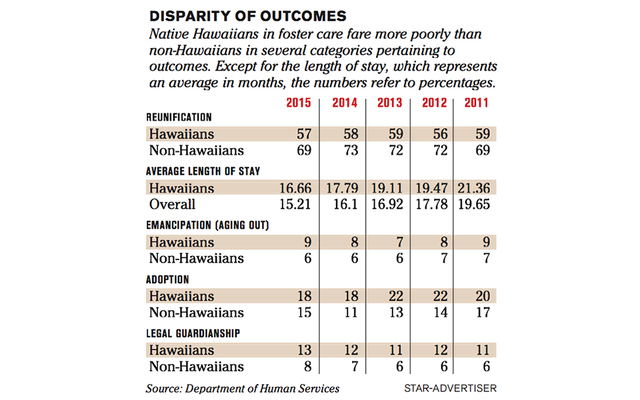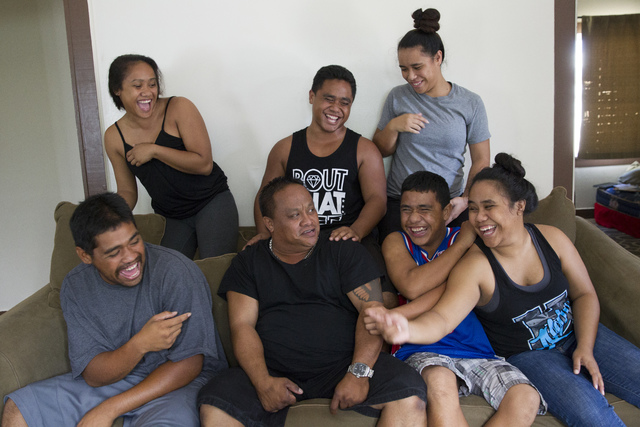Simeon U‘u’s six children spent years in foster care before he changed his ways and got them back



Krystle Marcellus / kmarcellus@staradvertiser.com
Simeon U‘u is surrounded by his kids — clockwise from bottom left, Sean, 24; Shyla, 19; Simeon IV, 15; Salena, 18; Samantha, 22; and Solomon, 13 — at their Wailuku home. Sean said that his father’s determination to bring the family back together is “one of the best things ever.”

Krystle Marcellus / kmarcellus@staradvertiser.com
That was part of the motivation that kept me alive. You know, that fire in me to believe that my kids, I still got a chance to get them back.”
Simeon U‘u
Tour bus driver and father of six




WAILUKU >> The odds of Simeon U‘u reuniting with his children looked slim in October 2009.
The Native Hawaiian father was just beginning another prison term, this time for a probation violation.
His lengthy criminal record dated to 1990 and included convictions for forgery, theft and domestic violence.
He also had a history of substance abuse and homelessness, plus a stormy relationship with his wife.
And the couple were no strangers to child welfare authorities, who had removed the U‘u children several times since the 1990s because of safety concerns. The last time was several months before U‘u’s incarceration in 2009.
At his lowest point in prison, U‘u, a broad-shouldered man with tattoos down one arm and a thick silver chain around his neck, doubted he would get his children back. “I felt like I was a bad parent, that I abandoned them.”
Don't miss out on what's happening!
Stay in touch with breaking news, as it happens, conveniently in your email inbox. It's FREE!
But he said he was determined to change that.
While in prison, U‘u maintained regular contact with his children and participated in parenting, drug abuse and anger management programs to better his chances of reuniting his family.
“That was part of the motivation that kept me alive,” the 45-year-old tour bus driver said during a recent interview at his home here, surrounded by his six children. “You know, that fire in me to believe that my kids, I still got a chance to get them back.”
U‘u did get them back. Within six months of his 2011 prison release, the family was reunited — except for the mother, who remains behind bars. U‘u and his children, who range in age from 13 to 24, are still together today.
“I’m sitting here four years later and I still have my kids, so I must be doing something right,” U‘u said, adding that he has remained sober since 2009. “It was a long journey.”
Honored for efforts
A parenting class based on Hawaiian cultural values helped him focus on his children, U‘u said.
While U‘u spoke, laughter filled the small living room of his rented home. His children were joking about school, dating and who got first dibs at a newly opened container of ice cream.
In one sense U‘u has defied the odds — and not just because of his troubles with the law or his checkered domestic history.
Over the past five fiscal years, only 58 percent of Hawaiian children in foster care have been reunited with their families, according to Department of Human Services data. For non-Hawaiians the reunification rate was 71 percent.
U‘u’s success did not go unnoticed.
The family and the team that helped them were honored in June 2013 on Maui as part of National Reunification Month.
“He did everything he could to get his kids back,” said Elladine Olevao, Maui administrator for Child Welfare Services, the arm of DHS that oversees the foster system. “And once he got them back, they thrived.”
When DHS was considering reunification, several factors favored U‘u. He had landed the tour bus job, secured housing, followed his DHS service plan, which included the prison classes, and maintained regular contact with his children, even while incarcerated.
But DHS also had to consider that U‘u had been reunified with his children before, only to have them taken away again. The agency this time, though, detected something different. U‘u seemed more committed to making reunification work, according to Olevao.
“There was something about him this last round that you could tell it was worth putting as much energy as possible to get his six kids back with him,” Olevao said, crediting his DHS case manager, Christina “Satyo” Dosland, for playing a key role.
Overcoming turmoil
U‘u’s determination to regain custody of his children and provide a stable home stemmed in part from his desire to stop making the same mistakes as his father, who had a drinking problem and fought often with his wife. As a child, U‘u sometimes intervened to break up the altercations.
“I promised myself that I would never be my father’s son,” he said.
The parental fights stopped when U‘u was 13. One day he found his mother collapsed in a bathroom, dead from a heart attack. At 15 he learned that his father, a construction worker, was fatally shot while drinking with a buddy after work at a Kakaako job site.
Tired of his own domestic turmoil, U‘u said he stopped doing drugs prior to his most recent incarceration. He remembers the October date — the same one as a daughter’s birthday and his father’s murder. At the time, he decided his top priority had to be his children. The guilt of being a neglectful parent had become too great, and U‘u said he didn’t want his sons and daughters to be raised in foster homes.
In some ways the experience of the U‘u children underscored disparities for many Hawaiians in foster care.
The U‘u children re-entered the system multiple times, which was in line with research several years ago that found Hawaiians were more likely to re-enter foster care than non-Hawaiians.
During U‘u’s most recent experience, they remained in foster care for about two years. That was more than the nearly 19 months that Hawaiians on average stayed in foster care over the past five fiscal years, according to DHS data. And the two years easily topped the 17-month average for non-Hawaiians.
Mirroring another poor outcome for Hawaiians, two of the children aged out of the system — turned 18 before being reunified or permanently placed with a family. That’s an outcome the agency tries to prevent. Yet Hawaiians in each of the past five years have aged out at a greater rate than non-Hawaiians.
One of the six children also had dealings with the juvenile justice system, where Hawaiians also are overrepresented.
For the U‘u children, talking about foster care still resurrects painful memories.
Several recalled being angry at their parents for breaking up the family.
Some voiced feelings of guilt, wondering whether their behavior contributed to what happened.
“You think, maybe if you clean up your room or put all the toys away, maybe it might help,” Salena U‘u, 18, told the Honolulu Star-Advertiser. “But it wasn’t any of that. It was something bigger.”
Sean U‘u, who is the oldest of the siblings, said he realizes that his father made poor choices in the past. “But everybody makes mistakes. You learn from them.”
When the younger U‘u was asked about his father’s successful resolve to reunify the family, he started to respond, paused, then dabbed away tears.
“It’s one of the best things ever,” Sean U‘u said. “I can say right now my dad has changed a lot. He’s changed so much. …”
Overcome with emotion, the young man was unable to finish his answer.
__________
Rob Perez reported this project with the support of the Fund for Journalism on Child Well-Being and the National Health Journalism Fellowship. Both are programs of the Center for Health Journalism at the University of Southern California Annenberg School of Journalism.
This project also was done in collaboration with Oiwi TV, the Native Hawaiian-owned and operated media outlet that tells stories from a Hawaiian perspective. For more video, see http://oiwi.tv/culture/keiki-hawaii-foster-care/
17 responses to “Simeon U‘u’s six children spent years in foster care before he changed his ways and got them back”
Leave a Reply
You must be logged in to post a comment.






Good for him and his family. I wish them all the best.
Great job Dad, keep up the good work!
God bless you, Simeon and all of your 6 children. You overcame and defied the odds by persevering to reunite with your children. Your children also overcame adversity and seem very happy and settled to have you back in their lives as a changed man. You did good, extremely good, and yes, you are “doing something right” to still be together as a family. I believe you can motivate and inspire others who may have lost their way in life by perhaps being a speaker or coach for the prison programs that helped you become a successful working parent.
Great story, Rob Perez.
Take life one day at a time. Baby steps.
Reassuring the children that the parent’s death is not their fault. Kids tend to blame themselves.
Let’s hope that Wall Street’s Republicans continue to fund these social programs for Main Street.
Birth control should help.
I agree!
Too many folks having too many kisses they can’t afford to support both financially or emotionally.
20 seconds of fun and 20 years of suffering.
Now were getting somewhere. More stories on these kind of cases and discrimination should be made. I would like to know why I can’t get my twins back out of guardianship? Is it because the guardians make over $2000 a month in benefits? Is it because I’m a druggie, or an alcoholic?? I’d like to know why taxpayers got to pay for my twins to be living in two separated households, and even though I’ve tried many times to reunite with my kids, the courts say “NO!” What is it? Am I a crystal meth? Do I look like one? Or is it because these Japz target us and want to make our lives miserable to compensate for their attorney pro-bono work Dawn Slaten’s midget stature while their guardians live nicely off taxpayers paycheck. One of the underlying reasons Im running for Mayor, I’d like to get my twins back? Is that okay? Can I get them reunited living in the same house? It’s been 13 years, isn’t that long enough Hawaii?? Or now they say, too much time has gone by, so that I will never get them back. Thanks alot Hawaii!! Or taxpayers just like paying other people $2000 a month to raise other peoples kids? What is it??
I’d like to have my twins back, can I have my twins back?? After 13 years? Tax payers has paid over $200,000 to care for my kids. To have some other people take care of my kids? Thanks alot, I ain’t no druggie, I ain’t an alcoholic? So what is it? Who do I blame? What a waste of taxpayers money!! And these people hide because they know they guilty of something. I hope to put them in jail, every year for every year they had my kids. Oh, and I’m soppose to thank them and show appreciation that they are caring for my kids. WEll here’s your THANK YOU!! So now can You do the right thing and give them back. And go get a regular job, instead of living off my kids!!
Howie, under Hawaii guardianship law, you cannot get your kids back until they’re 18(or 21?). And that’s IF!!! they want you back in their lives. You’re lucky they weren’t adopted, or you’d never get them back. You should be grateful, not blaming blame Hawaii taxpayers for supporting your kids. Like you’ve admitted, we paid over $200K to care for your children. Your twins might be living in two different households for several reasons. One might be because each family could not care for both kids, financially or emotionally. Another reason might be because the dominant child was deemed physically or emotionally abusive to the other one. If you’re looking to blame…..look in the mirror. We don’t know your story. From what you share, it seems like you really screwed up. Give me your name or your baby mama’s name. I’ll track down your story of how CPS did you wrong.
That is a man right there! He owed it to his kids to provide them with a life and a future of happiness and opportunities and he is doing just that. His is a story of overcoming whatever obstacles life throws at you. I wish Simeon and his family all the best.
lowtone, agree. Having all your children returned to you is a major accomplishment, especially if Mom is still incarcerated. Now raising these children will take a tremendous sustained will to succeed, along with assistance from government and family resources. Good luck, my man. I will pray for you.
Kids getting trap in the adults problems. Leave the kids out of your messed up life, and clean up your life. Do it for the kids, if not for yourself.
Shucks! This old buck can hardly finish reading this article. Having the same trouble like the son Sean, too much water in the maka. Speaking of heroes, one finds them at the least expected place. It takes a lot of courage and discipline to overcome past failures and weaknesses. This guy has made a wise choice, pray that he and his family much blessings and happiness!